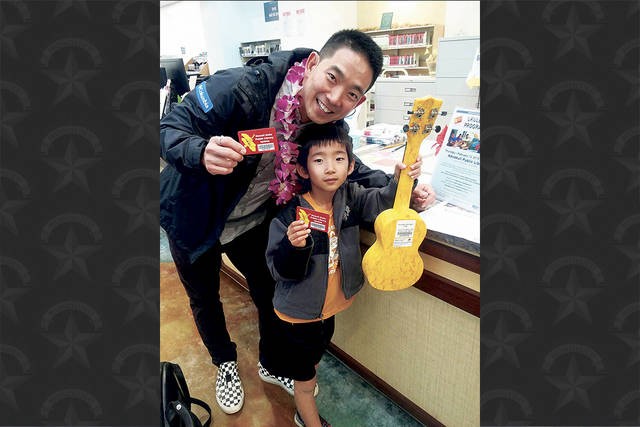As interest in the ukulele soars across the country, the Aloha State is starting to make the perky little instrument available free to use through its public libraries.
Patrons at Nanakuli Public Library can already borrow an ukulele with their library card just like they can check out books, and starting Wednesday evening, Waimanalo Public Library will start lending them out too.
Music for Life Foundation, a tiny local charity founded by flight attendant Leo Daquioag, launched the program in partnership with the Hawaii State Public Library System.
The idea of freely sharing ukulele came to Daquioag when he was far from home. Raised in a musical family in Kaneohe, he was inspired by the pianos he saw placed in public spaces for passersby to play in cities like New York and Paris.
“I thought, why couldn’t we do that with ukulele?” he said. “Just put an ukulele out there, or a bunch of ukulele … . My intent was to offer it to kids who would not otherwise have the opportunity to play a musical instrument.”
BORROW AN UKULELE
>> Nanakuli Public Library, available now
>> Waimanalo Public Library, starts WednesdayFeb. 27 after a free class from 6:30-7 p.m. Call 808-259-2610 to register. Participants will get the first chance to borrow an ukulele.
>> Ukulele can be borrowed for three weeks.
>> To donate to Music for Life or for more information, visit musicforlifefound.org.
Scattered throughout the islands and accessible to everyone, libraries seemed like the perfect venue. And ukulele — portable, easy to play and a staple of life in the islands — seemed like the perfect instrument.
Fortunately, state librarian Stacey Aldrich saw it the same way and the project launched Feb. 14 in Nanakuli. Kala Brand Music Co. donated enough ukulele to get the program rolling in several library branches — about a dozen per library — and more sponsors are being sought.
“This is a really great example of how local branches make connections in their communities,” Aldrich said. “We are always looking for ways to support and bring opportunity to the community.
“Music is another form of storytelling and our libraries are about stories,” she added.
Music for Life, an all- volunteer operation founded in 2010, hopes to spread the program statewide, giving kids, kupuna and everyone in between a chance to sample an ukulele and see where it takes them. Nanakuli Library branch manager Kelsey Faradineh said patrons of all ages are borrowing the new ukulele, which they can keep for three weeks, just like a book.
“They want to try it out and see if it’s something they want to pursue,” she said. “Music is so beneficial, from learning to communication and connecting with others.”
UP FOR UKULELE
Retail sales of ukulele in the United States rose 80 percent between 2013 and 2017
>> 2013 | 966,340
>> 2014 | 1,010,000
>> 2015 | 1,197,000
>> 2016 | 1,400,000
>> 2017 | 1,750,000
Source: National Association of Music Merchants
Along with seeking more ukulele donations, Music for Life is encouraging musicians to give back by “adopting” their local library and offering workshops to introduce players to the instrument.
Oddly enough, libraries on the mainland actually beat Hawaii to lending out ukulele alongside books. Public library branches in states stretching from Maine to Nebraska to Oregon have launched similar programs in the past several years, letting patrons borrow ukulele or offering classes in libraries. There is even a Facebook group called “Librarians with Ukes.”
Retail sales of ukulele in the United States have shot up 80 percent from 2013 to 2017, reaching 1.75 million units sold, according to the latest data from the National Association of Music Merchants.
The resurgence of interest in ukulele can be traced in part to standout players like Jake Shimabukuro, who lifted the instrument to new heights with showstoppers such as “While My Guitar Gently Weeps.” An honorary board member of Music for Life, he is co-directing the ukulele-lending project.
“We’re here tonight because we all believe that music should be accessible to everyone,” Shimabukuro said at the kickoff in Nanakuli. “Music is not a privilege. I think it’s a right. … I think music is truly the language of human emotion.”
Shimabukuro first picked up an ukulele at age 4 and spent hours on his own with it.
“When you have the opportunity to take an instrument home and to play in your room, with no one judging you, no one listening to you, no one telling you, ‘No, that’s not how you should do it’ … there is something that happens in that moment,” he said.
Along with the balm it offers to an individual soul, making music brings people together. The ukulele, in particular, draws people to it: “It’s like bringing a baby into a room,” Daquioag said.
The colorful Waterman ukulele donated to local libraries by Kala Brand Music Co. are made of high-grade polycarbonate plastic so they are durable and water resistant. Each instrument comes with a tuner and a canvas drawstring backpack. The foundation will replace strings as needed.
In 2016, to mark the 100th anniversary of Kamaka Hawaii, Shimabukuro repaired 100 Kamaka ukulele that had been languishing in local public schools. Daquioag even ferried instruments to Shimabukuro to work on while the maestro was on tour in various cities.
“Our mission is to empower people through music,” Daquioag said. “In Hawaii, above all, music identifies our culture.”




